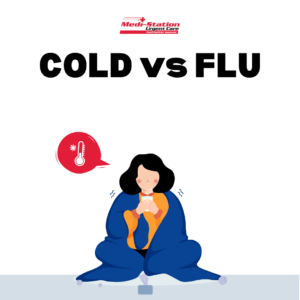Cold vs. Flu: Understanding the Differences and When to Seek Care
As temperatures drop, cold and flu cases often start to rise, leaving many of us wondering whether that scratchy throat or sudden fatigue is just a mild cold or something more serious, like the flu. Knowing the difference can help you take the right steps for treatment and keep your loved ones safe. At MediStation Urgent Care, we’re here to help you identify symptoms, provide prompt care, and ensure you’re back to feeling your best.
Cold vs. Flu: How to Tell Them Apart
While colds and the flu are both viral respiratory infections, they have distinct symptoms and levels of severity. Here’s a breakdown of the primary differences:
1. Onset of Symptoms
- Cold: Symptoms usually develop gradually over a few days.
- Flu: Symptoms appear suddenly and can be intense from the start.
2. Common Symptoms
- Cold: Typically causes sneezing, sore throat, stuffy nose, and mild fatigue. Body aches are usually mild or absent.
- Flu: Often includes fever, chills, severe body aches, headache, and significant fatigue. Coughing and sore throat may also occur, and symptoms are generally more severe.
3. Duration of Illness
- Cold: Generally lasts 7-10 days.
- Flu: Symptoms can last from a week up to two weeks, with fatigue lingering even longer in some cases.
4. Fever
- Cold: Fevers are rare in adults but can occasionally occur in children.
- Flu: A high fever is a hallmark of the flu, often exceeding 100°F, especially in the early days of the illness.
Managing Cold and Flu Symptoms at Home
For mild cases, both colds and flu can be managed with rest, hydration, and over-the-counter medications for symptom relief. Some home remedies that may help include:
- Hydration: Drinking plenty of fluids helps flush out the virus and keeps your body functioning well.
- Rest: Giving your body time to recover is key to bouncing back quickly.
- Warm, soothing liquids: Herbal teas, broths, or honey and lemon can ease a sore throat and soothe congestion.
When to Seek Urgent Care
For moderate to severe symptoms or those at higher risk (e.g., young children, older adults, or individuals with compromised immune systems), it’s important to seek medical attention. Visit MediStation Urgent Care if you experience:
- Persistent fever above 100°F
- Difficulty breathing or shortness of breath
- Severe sore throat, body aches, or headaches
- Symptoms that worsen or don’t improve after a few days
- Confusion or dizziness
Our healthcare providers can assess your symptoms and, if needed, offer antiviral medications for the flu, which are most effective when taken within 48 hours of symptom onset.
Preventing Colds and Flu
Prevention is the best medicine when it comes to colds and flu. Here are a few ways to reduce your risk:
- Get a Flu Shot: Flu vaccines are the most effective way to prevent flu and its complications.
- Practice Good Hygiene: Wash your hands frequently and avoid touching your face to prevent the spread of germs.
- Stay Home When Sick: Rest and recover at home to protect those around you.
Visit MediStation Urgent Care for Fast, Compassionate Care
If you’re uncertain whether your symptoms point to a cold or the flu, or if you need relief from severe symptoms, the team at MediStation Urgent Care is ready to help. With prompt, personalized care, we’ll assess your condition, offer guidance on treatment options, and support you on your way to recovery.
Don’t let a cold or flu hold you back—visit MediStation Urgent Care to get the answers and care you need!

